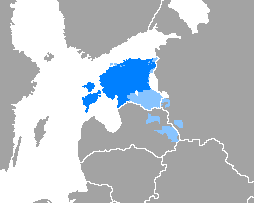
Estonian is a Finnic language and the official language of Estonia. It is written in the Latin script, and is the first language of the majority of the country's population; it is also an official language of the European Union. Estonian is spoken natively by about 1.1 million people; 922,000 people in Estonia, and 160,000 elsewhere.

The University of Tartu is a public research university located in the city of Tartu, Estonia. It is the national university of Estonia. It is the biggest and most prestigious university in the country. The university was founded under the name of Academia Gustaviana in 1632 by Baron Johan Skytte, the Governor-General of Swedish Livonia, Ingria, and Karelia, with the required ratification provided by King Gustavus Adolphus, shortly before the king's death on 6 November in the Battle of Lützen (1632).
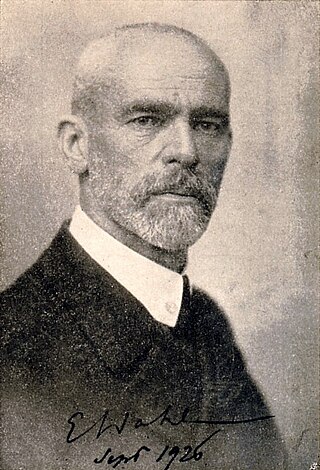
Edgar Alexei Robert vonWahl was a Baltic German mathematics and physics teacher who lived in Tallinn, Estonia. He is best known as the creator of Interlingue, an international auxiliary language that was known as Occidental throughout his life.

Võro is the language of South Estonia or a language belonging to the Finnic branch of the Uralic language family. Governmentally, it has been considered a dialect of the Estonian language along with all varieties of South Estonian. However, many linguists consider South Estonian to be an independent Finnic language. It has its own literary standard and efforts have been undertaken to seek official recognition as an indigenous regional language of Estonia. Võro has roughly 75,000 speakers (Võros), mostly in southeastern Estonia, in the eight parishes of the historical Võru County: Karula, Harglõ, Urvastõ, Rõugõ, Kanepi, Põlva, Räpinä and Vahtsõliina. These parishes are currently centred in Võru and Põlva counties, with parts extending into Valga and Tartu counties. Speakers can also be found in the cities of Tallinn and Tartu and the rest of Estonia.

Boris Meissner was a German lawyer and social scientist, specializing in Soviet studies, international law and Eastern European history and politics.

The Estonian Students' Society is the largest and oldest all-male academical student society in Estonia, and is similar to the Baltic German student organizations known as corporations (Corps). It was founded in 1870 at Tartu. It has over 900 members in Estonia and abroad.

Lilli Suburg was an Estonian journalist, writer and feminist. In 1882, she established a private primary school for Estonian girls in Pärnu, in 1885 she moved it to Viljandi where the number of pupils expanded. In 1887–1894, she founded and began publishing the first women's magazine in Estonia, Linda. When forced to sell her journal, Suburg moved to Latvia and headed a school there until 1907.

Estonian partisans, also called the Forest Brothers in Estonia were partisans who engaged in guerrilla warfare against Soviet forces in Estonia from 1940 to 1941 and 1944 to 1978.
The Letter of 40 intellectuals, also The letter of 40, originally A public letter from Estonian SSR was a public letter dated October 28, 1980 and posted a week later, in which 40 intellectuals attempted to defend the Estonian language and expressed their protest against the recklessness of the Republic-level government in dealing with youth protests that were sparked a week earlier due to the banning of a public performance of the band Propeller. The real reasons were much more deep-seated, and had to do primarily with the Russification policies of the Kremlin in occupied Estonia.
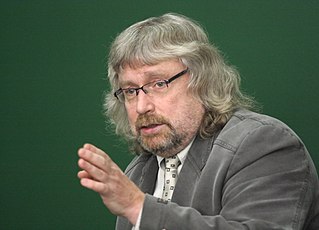
Lauri Vahtre is an Estonian politician, historian, translator and writer.
Otto Liiv was an Estonian historian and archivist. He was one of the founders of Estonian archival science as well as one of the most prolific and respected historians in Estonia.

Liis Koger is an Estonian painter and poet based in Tallinn.

Peeter Järvelaid is an Estonian legal scholar and historian. Järvelaid is a professor in the University of Tallinn. He has developed semiotic and personality-centered research direction, writing hundreds of articles mostly about the European and Estonian legal history and education, published in Estonian, English, German, French, Russian, Latvian, Finnish, Lithuanian and Swedish. Since 2006 his studies have been increasingly concentrated on the international relations in the 20th century, which among others has required intensive archival researches in German and Polish archives. Since 2012 Järvelaid has placed his research emphasis on the German diplomatic missions, with a specific interest in German diplomatic representation in Tallinn.

Urmas Sutrop is an Estonian linguist.
Vera Poska-Grünthal (1898–1986) was a leading Estonian feminist. She was one of the founders of the International Federation of Women Lawyers (IFWL), an International Non-Governmental Organization (NGO) that enhances the status of women and children by providing legal aid, legal literacy and education programs, and through advocacy, law reform, research and publications. She also founded the Estonian-language journal Triinu in Sweden in 1952, serving as its editor until 1981.

Tullio Ilomets was an Estonian chemist, science historian and a volunteer in heritage protection.
Elise Käer-Kingisepp was an Estonian physician, pharmacologist, physiologist and sports medicine specialist. She was one of the founders of the Estonian Association of University Women and was the second female scientist to graduate from the University of Tartu in Estonia.
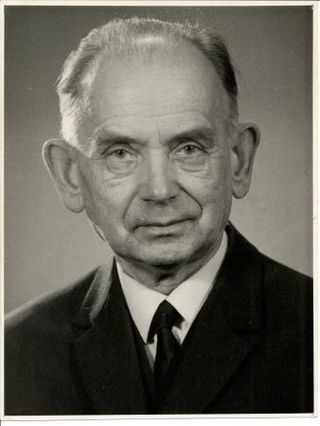
Arnold Kask was an Estonian linguist.
Linda was a feminist literary magazine which existed between 1887 and 1905. It was the first women's magazine in the country as reflected in its subtitle, Esimene literatuurlik ja ajakohane ajakiri Eesti naisterahvale.
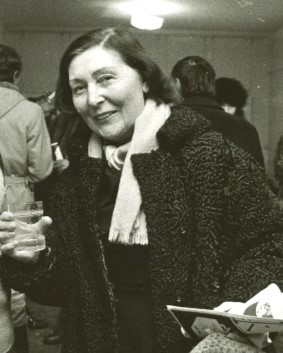
Helmi Üprus was an Estonian architectural and art historian. She trained in romance languages, studied English and ethnography, and earned a master's degree in art history from the University of Tartu in 1936. She worked her way up to head the cultural history department of the Estonian National Museum, where she researched folk art. In 1947, she began working at the Institute of History of the Academy of Sciences of the Estonian SSR. Persecuted by Stalinism she lost her job in 1950 and worked in a factory until Stalin's death. From 1953, she was the chief specialist in architecture and history for the government monument restoration service.














